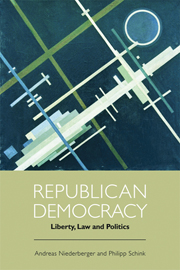Book contents
- Frontmatter
- Contents
- List of contributors
- Introduction
- 1 The Tension between Law and Politics in the Modern Republican Tradition
- 2 Impotence, Perspicuity and the Rule of Law: James Madison's Critique of Republican Legislation
- 3 Kant, Madison and the Problem of Transnational Order: Popular Sovereignty in Multilevel Systems
- 4 Republicanism and Democracy
- 5 Two Views of the City: Republicanism and Law
- 6 A Kantian Republican Conception of Justice as Nondomination
- 7 Two Republican Traditions
- 8 Freedom, Control and the State
- 9 Legal Modes and Democratic Citizens in Republican Theory
- 10 Rights, Republicanism and Democracy
- 11 Republicanism and Global Justice: A Sketch
- 12 Republicanism and Transnational Democracy
- Index
9 - Legal Modes and Democratic Citizens in Republican Theory
Published online by Cambridge University Press: 05 October 2013
- Frontmatter
- Contents
- List of contributors
- Introduction
- 1 The Tension between Law and Politics in the Modern Republican Tradition
- 2 Impotence, Perspicuity and the Rule of Law: James Madison's Critique of Republican Legislation
- 3 Kant, Madison and the Problem of Transnational Order: Popular Sovereignty in Multilevel Systems
- 4 Republicanism and Democracy
- 5 Two Views of the City: Republicanism and Law
- 6 A Kantian Republican Conception of Justice as Nondomination
- 7 Two Republican Traditions
- 8 Freedom, Control and the State
- 9 Legal Modes and Democratic Citizens in Republican Theory
- 10 Rights, Republicanism and Democracy
- 11 Republicanism and Global Justice: A Sketch
- 12 Republicanism and Transnational Democracy
- Index
Summary
If we think of a distinctly republican rule of law how would that alter common distinctions in republican theory made between “law's” citizenship and “democracy's” citizenship? Citizenship, in republican theory, seeks to express through a language of rights and a process of institutional engagements the ways in which we might actualize freedom of the individual through freedom from arbitrary interference or nondomination (Skinner 2008, Pettit 1997) when we come together in collective association. Its main concern, therefore, is with defining the commonwealth or civil association. Republican freedom represents a distinct conception of freedom as nondomination where freedom consists not in the noninterference of others as in negative liberty, nor as self-mastery as in positive liberty, but rather in agency, in that agents are free when they engage in reflection and choice and are, thereby, as actors and authors, freed of the possibility of arbitrary interference, or domination by others. In this understanding the constrained interference for the common good in the form of shared laws is nonarbitrary and, therefore, does not violate the republican principle of freedom. In what follows, I explore and evaluate three legal modes of democratic citizens that correspond to this understanding of freedom and analyze these modes in regards to the core concern of constituting civil association for the common good through equal participation.
- Type
- Chapter
- Information
- Republican DemocracyLiberty, Law and Politics, pp. 233 - 252Publisher: Edinburgh University PressPrint publication year: 2013



